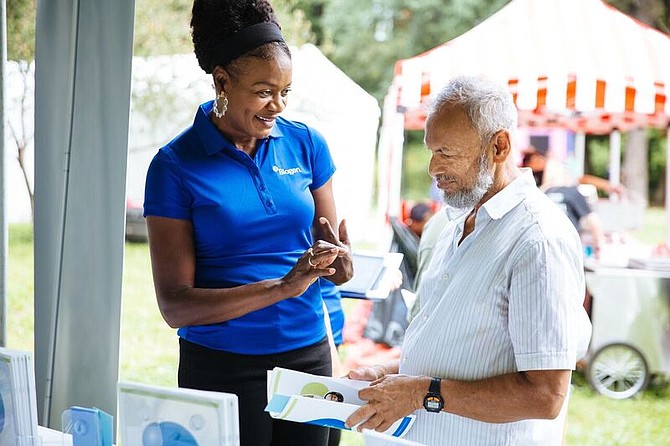Improving Health Outcomes through Equity and Access
Better access to healthcare equals better health outcomes. Biogen strives to increase access and address the barriers that patient populations face. Oftentimes, health outcomes depend on factors beyond the control of patients and their doctors. Disparities across age, gender, race, ethnicity and socioeconomic level are some examples. One of the key parts to Biogen’s approach involves researching and understanding these issues as well as their compounding factors, such as, inadequate representation in clinical trials and limitations to accessing care. Overall, the goal is clear: improve health outcomes for Black, African American, Hispanic, Latino and other underserved communities in Biogen’s main disease areas.
Research and Collaboration
Issues of culture awareness and mistrust remain prevalent alongside a host of other considerations prior to enrollment in a clinical trial. To address these issues, Biogen uses a multi-channeled health equity strategy which includes incorporating diverse community perspectives and insights into our drug development and engaging with the community by partnering with organizations to educate, build awareness, establish trust and drive health equity.
In partnership with the Center for Information and Study on Clinical Research Participation (CISCRP), Biogen formed a Community Advisory Board (CAB) of patient advocates from underserved and underrepresented communities who co-develop honest and transparent educational assets for patients, HCPs and clinical trial sites to discuss the importance of diversity in clinical trials. The CAB has also advised on various program and study designs as well as the development of Biogen Trial Link, a publicly facing website to learn more about and find clinical trials.
In collaboration with the National Minority Quality Forum (NMQF) Biogen launched the Clinical Trial Index and Clinical Trial Learning Community (CTLC) which uses U.S. heat maps of Medicare/Medicaid beneficiary data by patient demographics and maps them against clinical trial site locations. This information seeks to identify the right sites in the right locations to meet patient needs. The CTLC launched as a virtual space for local stakeholders and subject matter experts to integrate routines in local care networks to increase underrepresented and underserved population participation in clinical trials.
Clinical Recruitment and Specific Disease Areas
As the clinical study recruitment begins, Biogen teams track and report their progress toward the study targets that represent the epidemiology of their respective disease. Given this commitment, 2021 had 100% of Phase 1–4 studies in the U.S. including a plan to recruit participants from underrepresented communities to ensure the study population is representative of the intended treatment population. They also launched an Internal Participant Demographic Distribution Dashboard to track and measure the demographic distribution of participants across programs and studies, and to compare directly to epidemiology targets. Within certain disease areas, Biogen has built community and faith-based outreach and education programs for disease awareness and general clinical trial education with trusted organizations such as HEAL Collaborative and Proximity Health Solutions.
In Alzheimer’s specifically, they have sponsored the Bright Focus Foundation’s Virtual Community Outreach Series, bringing sustained Alzheimer’s disease and clinical trial education and access to communities with an underrepresented focus. Additionally, Biogen co-developed a paper with the NMQF titled “A Roadmap for Real-World Evidence Generation in Alzheimer’s Disease.” It highlights how real-world evidence can include larger patient populations that are historically underrepresented in randomized controlled trials.
In Lupus, Biogen collaborated with Saira Z. Sheikh, M.D., Director of University of North Carolina (UNC) Rheumatology Lupus Clinic and Director of the Clinical Trials Program at UNC’s Thurston Arthritis Research Center, to gather insights on barriers to clinical trial enrollment among underrepresented groups. These insights are being used to inform Biogen’s clinical development programs in lupus and address equity in study participation. For the Phase 3 studies in systemic lupus erythematosus (SLE), Biogen set enrollment targets that reflect the prevalence of SLE in Black or African American and Hispanic and/or Latino communities to achieve appropriate representation. Through partnerships with community-based Proximity Health Solutions and faith-based HEAL Collaborative, along with expert panels of community leaders, HCPs and patient advocates, they participated in seven events across the U.S. in 2021 to educate communities about lupus and clinical trial research.
A Holistic Approach to Inclusion and Equity
Beyond this commitment to the patients and their specific needs, Biogen also focuses on the workers involved in clinical trials. In 2021, they joined the Association of Clinical Research Professionals (ACRP) as part of ACRP Partners in Workforce Advancement™, which works to expand the diversity of the clinical research workforce and to set and support standards for workforce competence.
Additionally, Biogen has fostered employee collaboration to increase awareness of health equity needs cross-functionally. In 2021, they introduced a Health Equity Ideas Cafe Series to deepen organization-wide understanding of Biogen’s commitment, including representation in our clinical trials and equitable access. The three-part series engaged internal and external guest speakers on themes of lupus awareness, patient voices and community partnerships, and equitable access to healthcare. In addition, Biogen hosted an event with John Sawyer, Ph.D., ABPP-CN and a board-certified clinical neuropsychologist of the Ochsner Neuroscience Institute; and Donnie Batie, M.D., on successful approaches to caring for underrepresented patients.
Visit Biogen Trial Link to learn more about clinical trials and how you can support equity and access efforts such as these.
Latest Stories
- Reminder: Taxes are due December 15, 2025. Pay now to avoid late fees. Struggling financially? Our Payment Plan Calculator is a tool you can use
- TWO GOVERNMENTS TO FORMALIZE HISTORIC PARTNERSHIP IN ADDRESSING MENTAL HEALTH CRISIS DURING THE HOLIDAY SEASON
- Trump's Policies Negatively Target Women
- Assessor Kaegi, South and West Side Community Leaders Urge Legislature to Pass Property Tax Relief, Condemn Board of Review's Large Breaks for Downtown Commercial Properties
- State Farm and The Salvation Army Launch National Donation Drive to Support Families This Holiday Season
Latest Podcast
Stacy Davis Gates

